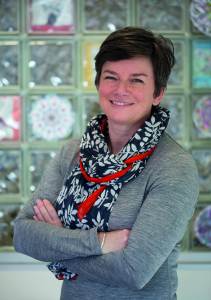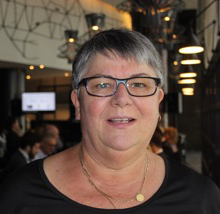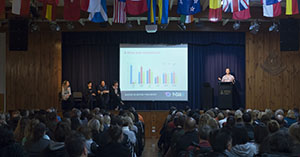Kirsten Cleland has worked in the mental health field for more than 20 years
and in youth mental health for the past eight years with headspace.
Q. ARE PARENTS INSTINCTS IMPORTANT IN RECOGNISING IF THEIR CHILD IS STRUGGLING
WITH SOMETHING IN THEIR LIFE?
”Parents know their children better than anyone else in the world. If you sense there is something going on for your child that is not usual, and it has happened consistently, see your GP.
If you sense your GP is not taking you seriously, then I strongly recommend you get a second opinion – maybe from a GP who specialises in young people or someone with an interest in mental health.”
Q. HOW PREVALENT ARE MENTAL HEALTH DIFFICULTIES IN YOUNG PEOPLE?
”One of the reasons headspace was set up was that 75 per cent of all mental health difficulties occur before the age of 25. By mental health difficulties, I’m talking about social or family difficulties, bullying or stress at school and young people questioning their gender role or sexuality through to anxiety and depression.
It’s a time of massive change – puberty, the transition from primary to secondary school, young people making decisions about what they are going to do with their life and wanting to be more
independent from parents …”
Q. HOW DO YOU GET YOUR KIDS TO TALK ABOUT THESE ISSUES?
”Kids can feel uncomfortable speaking with their parents about issues that are concerning them. So it is important for them to know who is in that young person’s life that they can talk to? A footy coach, teacher, mum, dad, grandparents, godparents. Make yourself available.
Kids always (often?) want to tell you the most important things as you’re walking out the door, making dinner or on a business call. It won’t always be at the most convenient time. It is important
that you take this opportunity to engage with your young person, as this is the moment when they have come to you for help. If you’re trying to start the conversation, evidence indicates statements help like ‘I’ve noticed… it seems like… I’m wondering… you don’t seem yourself, you seem really tired…’ Be inquiring rather than accusatory. You shut off the opportunity for communication if young people see it as potentially adversarial or feel they’re going to get in trouble.”
Q. WOULD YOUR CHILD LIKE YOU TO FIX THE PROBLEM, OR DO THEY WANT YOU TO SIMPLY LISTEN?
”I often say to my kids, ‘would you like me to fix this or would you like me to listen?’ By giving them an opportunity to decide what type of support is available you are allowing them to have a degree of control as well as letting them know you trust them to know what they need. Often, at first, they just want you to listen because listening is an opportunity to join around a shared concern. Then you can ask ‘what can I do?’, however you are enabling your child to have a degree of responsibility and you’re demonstrating you have faith in their ability to make decisions. That’s our job as parents – to help our kids made decisions. The decision might not be the one we would like, and it might blow up in their face, but as long as it’s not going to do harm then it’s a learning
opportunity.”
Q. HOW DO YOU KEEP COMMUNICATION OPEN WHEN YOUR CHILD DOES EVERYTHING TO AVOID TALKING?
”Young people can feel they have nothing of value to offer or they believe that what they have to say is important, especially if they are feeling so awful in themselves. Check-in with them regularly – tell them you’re making a cup of tea and would they like something? If they say no, ask again in an hour. Make their favorite meal for dinner and If they don’t leave their room, take a plate to them. Or sit with them and let them know you’ve noticed they are not themselves. Even if you’re not getting much back, the young person sees that mum or dad are reliable and are there for them. Remember to be consistent in what you say and do, and to follow through as this will demonstrate your reliability to them as a support.”
// Kirsten Cleland is a manager with headspace Early Psychosis Services and a former centre manager – headspace Elsternwick & headspace Bentleigh.

Kirsten Cleland. Headspace



